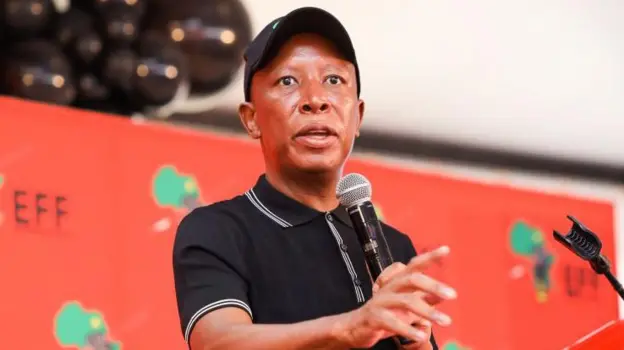The Economic Freedom Fighters (EFF) have taken aim at President Cyril Ramaphosa, accusing him of damaging South Africa’s international reputation during a recent high-profile visit to the United States. The party believes Ramaphosa’s remarks about violent crime and lawlessness during a meeting at the White House could have serious repercussions for the country’s economy, particularly in tourism and foreign investment.
EFF leader Julius Malema voiced his disapproval during a campaign stop in the Free State on Sunday, where he addressed supporters in Kwakwatsi ahead of the upcoming by-elections. The visit was part of a broader effort to mobilize grassroots support and reassert the party’s relevance during a key political moment.
Speaking to a crowd of Red Beret supporters, Malema expressed deep concern about what he called Ramaphosa’s failure to protect South Africa’s image on the global stage..”
Malema argued that while South Africans are aware of the country’s ongoing challenges with crime, airing such grievances in front of an international audience—particularly one as influential as the U.S. government—was irresponsible and damaging.
Ramaphosa and U.S. Diplomacy Under Fire
President Ramaphosa’s meeting with U.S. President Donald Trump, held in Washington, D.C., was widely publicized and hailed by some as a moment of strong diplomatic engagement. However, according to Malema and the EFF, the content of the discussions—particularly Ramaphosa’s openness about crime—reflected poorly on South Africa and could deter critical global partnerships.
The EFF has positioned itself as a fierce opponent of Ramaphosa’s leadership, frequently accusing the African National Congress (ANC) of failing to prioritize the economic and social well-being of ordinary citizens. In this instance, Malema emphasized the potential economic fallout from what he described as the president’s diplomatic misstep.
Tourism and Investment at Stake
Tourism remains one of South Africa’s key economic sectors, contributing billions to the GDP and supporting hundreds of thousands of jobs. The EFF fears that Ramaphosa’s remarks could lead to declining tourist numbers, especially from Western countries where perceptions of safety are a major factor in travel decisions.
Beyond tourism, Malema also warned that Ramaphosa’s comments could spook potential investors, particularly in a climate where foreign direct investment (FDI) is desperately needed to address South Africa’s high unemployment rate and stagnant economic growth.
The EFF has increasingly sought to frame itself as the party of national pride, economic independence, and pan-African unity. By criticizing Ramaphosa’s engagement with Western powers, Malema taps into broader concerns about the legacy of colonialism, economic imperialism, and the need for African leaders to speak from a position of strength on the world stage.
During his address in the Free State, Malema urged voters to support the EFF in the upcoming by-elections, promising that his party would restore dignity, protect national interests, and fight for equitable economic policies.
Ramaphosa Remains Silent on Criticism
At the time of writing, President Ramaphosa has not responded directly to the EFF’s criticism. His administration, however, has previously defended its diplomatic engagements with international partners as necessary for economic recovery and strategic alliances.
Presidency spokespersons have repeatedly emphasized the government’s commitment to transparency, acknowledging the challenges facing South Africa while continuing to seek global partnerships for economic growth.
Despite reassurances from government officials, the Economic Freedom Fighters’ (EFF) pointed criticism underscores the escalating political tensions in the lead-up to South Africa’s 2024 general elections.
Opposition parties are ramping up their efforts to challenge the ruling African National Congress (ANC), with President Cyril Ramaphosa at the center of increasing scrutiny. Balancing domestic discontent, governance challenges, and South Africa’s international reputation will be a delicate task. As political dynamics shift and public frustration grows, the ANC’s ability to manage both internal and external pressures will play a decisive role in shaping the outcome of the upcoming elections and the country’s future.
Source- EWN

